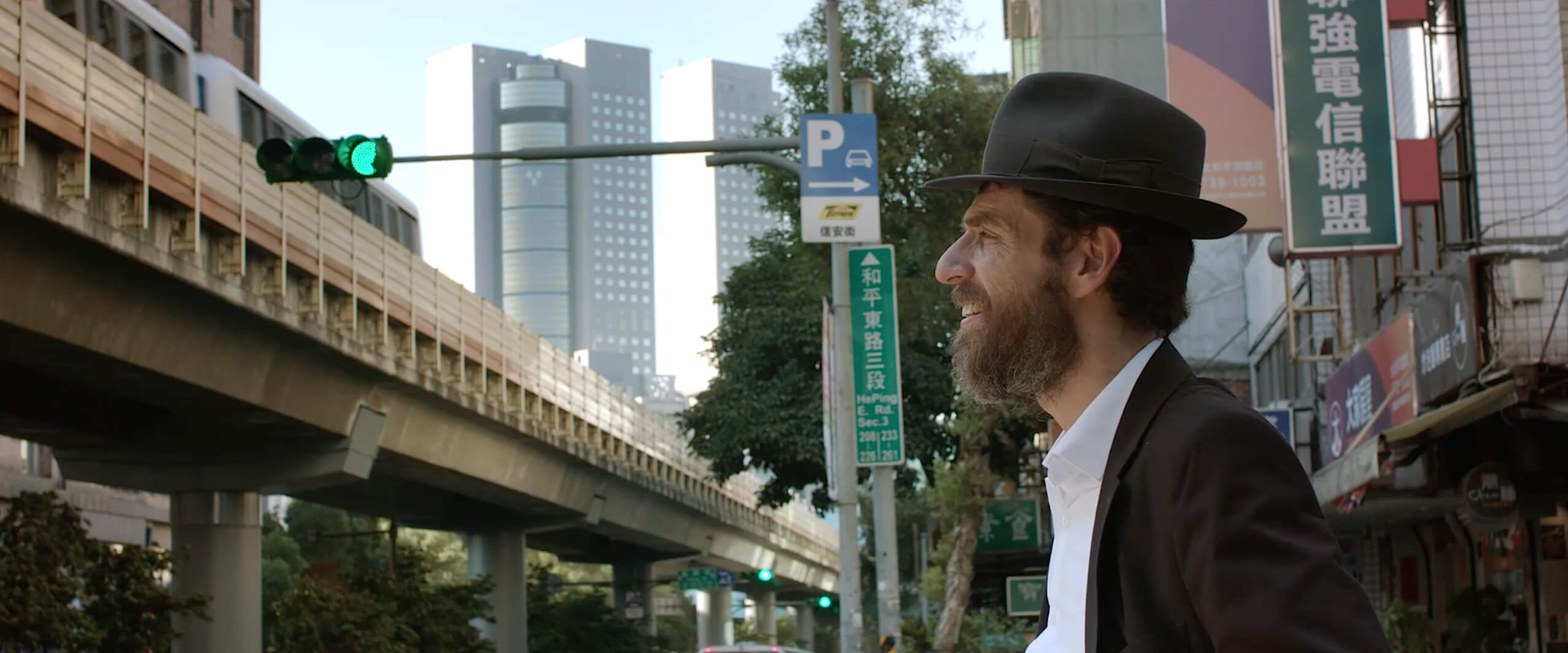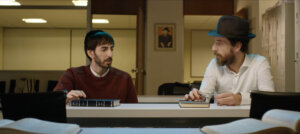From Argentina, a surprisingly delightful movie about a rabbi in Taiwan
In ‘Shalom Taiwan,’ a synagogue leader travels far out of his comfort zone to discover the secret to happiness

Graphic by Angelie Zaslavsky
Making his narrative film debut with ‘Shalom Taiwan,’ Argentinian director Walter Tejblum has helmed an utterly charming, heart-warming and at moments laugh-out-loud-funny comedy about a feckless Orthodox rabbi in Buenos Aires on a quest to track down some deep-pocketed contributors in, yes, Taiwan. His picaresque misadventures, which, predictably enough, leads to more realistic ambitions and family affirming values has its share of sentiment and familiarity. Nonetheless it remains an unexpected delight.
Short of some oblique impulse to compete with his synagogue’s former leader, a beloved big shot if ever there was one, it’s not entirely clear why Rabbi Aaron (charismatically played by Fabian Rosenthal) has embarked on a massive synagogue renovation featuring a more functional soup kitchen, an expanded dining room and beautiful new state-of-the-art pews.
When the film opens, the remodeling endeavor has been an ongoing mess for several years and the rabbi’s debt is mounting. The time to repay his major creditor Suarez (a top-notch performance from Carlos Portaluppi), who lent him $150,000, is upon him. Although Suarez initially promised that he would extend the due date if need be, the economy has deteriorated, the peso is not worth what it once was, and he has no choice but to demand payment or seize the synagogue as the agreed-upon collateral. Suarez plans to destroy the building and convert the property into a big money-making venture. Though he is the villain here, it’s not too difficult to see where he’s coming from either.
But for Rabbi Aaron, Suarez’s behavior is beyond comprehension. “This is a temple,” he cries out. The rabbi is a benign figure, well-intentioned, guileless and innocent. He’s almost a holy fool. “A rabbi without debt has no projects,” he tells a staff member. The fatuous remark is both strategy and personal conviction.
A hint of nostalgia is present too. Existing in an alternate universe, the rabbi is very much drawn to daytime dramas of the ’80s, describing the characters as if they were real and quoting their lines as words of wisdom. He parrots what some old soap’s hero said to his girlfriend as advice to a young rabbi on how to flirt with the receptionist: “You might not be perfect, but your flaws are charming.” The acolyte gives the line a shot; it misfires terribly.
There are many wonderful, comic bits. Determined to get the funds to pay Suarez, our protagonist first travels to New York (great shots of Eastern Parkway, Times Square and midtown) to court potential donors, a self-demeaning ritual that is part beggary and part seduction. Rosenthal brilliantly captures the exchange, where one party has all the power and agency.
Thanks to the faltering economy, nobody is in a philanthropic mood. Gazing out his would-be benefactors’ office windows onto gleaming, glassy skyscrapers, Rabbi Aaron remarks that it’s hard to believe that these people have a cash flow problem. One begrudging patron gives him $500.
A nice touch: This is a Spanish and Taiwanese language film with subtitles. Yet the rabbi speaks English (with a marked accent) in New York and later with his Taiwanese contacts who are also bilingual.

Disheartened, Rabbi Aaron returns to Buenos Aires, where his mother wants him to pay the rent on her sister’s apartment and his stay-at-home wife and mother of his three children feels overburdened with house chores. She wants to return to her career as a nutritionist and she’s feeling a tad neglected by her husband whose obsession with saving his synagogue takes precedence over everything else.
So, off he goes to Taiwan, rumored to be a good place to find donors. Much of the comedy stems from the unlikely image of a bearded and black-hatted Orthodox Jew strolling through congested Taiwanese streets and interacting with various Taiwanese characters. He spends one afternoon with a potential donor and his 5-year-old son in a Taiwanese amusement park. Rabbi Aaron desperately and futilely tries to broach the subject of money, though eventually gives up and succumbs to spending the day on various rides —Ferris wheels; merry-go-rounds; bumper cars. In the end, the dad hands over a $50,000 check with no fanfare and Rabbi Aaron high-fives the kid goodbye. But when they are out of sight, he runs amok in circles screaming, “Yes! Yes!” It’s a hilarious, triumphant and moving moment.
The movie also works well as a travelogue. Even as our protagonist slogs through the mountainous regions of Taiwan, exhausted
and weary, the viewer can’t help but marvel at the lush, bucolic scenery. When he arrives at the home of his next potential donor, living off the grid and flanked on all sides by nature, he finds himself face to face with a spiritual guru who has given away all his money to be in harmony with himself.
Here there is plenty of time. No schedules, no deadlines. They eat noodles. They sleep. They don’t speak. In response to the rabbi’s growing exasperation, the guru hands him a dollar. “What am I supposed to do with this?” the rabbi asks, to which the master sagely, cryptically replies, “Start over.”
Tejblum gently toys with Asian stereotypes, so it’s not surprising that Rabbi Aaron encounters a well-heeled, magnificently groomed, educated, articulate “Tiger Mom” who has no problem bribing the rabbi, asserting that she will give him every penny he needs if he can convince her young daughter to dump her boyfriend whom mom views as little more than a bum. Reluctantly the rabbi agrees, only to discover that they are truly in love and he cannot proffer mom’s counsel. In a rage, she throws him out of her house. Morality does not come cheap and time is running out for the rabbi, who learns that Suarez is beginning to dismantle the synagogue while his wife intimates that divorce is on the horizon.

Alone on a bench, heartbroken and beaten down, Rabbi Aaron has no idea what his next step should be when the hotel manager, the first person he met in Taiwan, surfaces and invites the rabbi to join him and his family for dinner. Yes, it’s an absurd coincidence, but it’s forgivable here. The rabbi accepts the invitation and experiences an epiphany when he sees the loving, warm family preparing dinner together and having a fine old time, even though they live in near-poverty.
Spoiler alert: he flies home revived and rejuvenated. He knows what he has to in connection with his family…and the synagogue. Taking the guru’s words to heart he “starts over.”
There are terrific performances throughout, but the film unequivocally belongs to Rosenthal, who brings to life a deeply sensitive and compelling figure, nowhere more poignantly than in the final moments when he can’t help but smile. It’s an expression awash in resolution and gratitude and evokes Charlie Chaplin in the iconic closing moments of “City Lights.” But make no mistake — the character is uniquely his own.
















